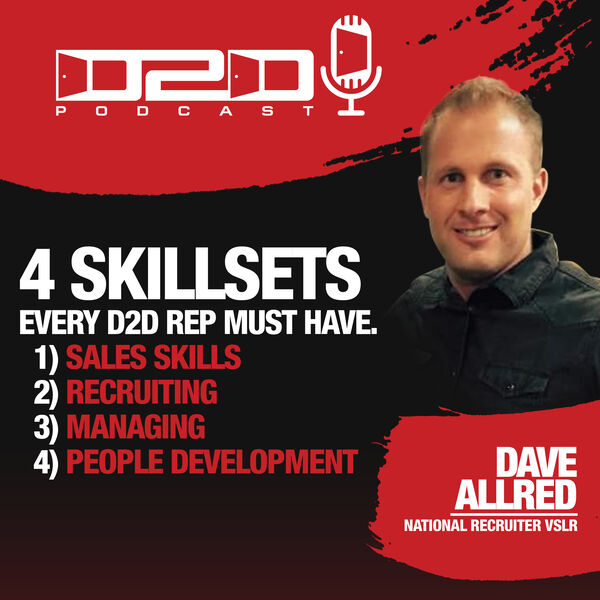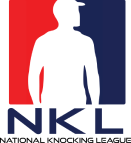Sam Taggart here – The force behind D2D Experts and your partner in all things sales.
If you’ve been following my journey, you know I’ve been knocking on doors since I was just 11 years old. From selling golf balls and lemonade to building a 7-figure consulting business, I’ve always believed in the power of face-to-face sales.
My mission with The D2D Association and D2DCon has always been to unify, uplevel, and bring honor and integrity to the D2D industry. And let me tell you, it’s been a ride!
Now, I’m super excited to share a special episode from a podcast I did a while back, where I hosted Dave Allred. Dave’s not just any guest; he’s a powerhouse in the business world and a staunch advocate for “Lifestyle Freedom.”
We had an incredible chat about the top skills every door-to-door rep should master.
Let’s dive into the insights and takeaways from our conversation.
Speaker 2: (00:19)
All right, man. We are on Facebook Live. We’re live. We’re live here with Dave AllRed. So, let me give you his background. Dave has over 15 years in door-to-door knocking, but it doesn’t look like it. He still looks like he is 20. Um, and he has made millions in this space. Dave is already one of the biggest regionals at Vivint.
Speaker 2: (00:39)
Dave and has done some phenomenal, phenomenal stuff. So I’m super excited. This is like a special treat to get him on the show. So yeah. Cool. So Dave, tell us a little about, like, rewind 15 years ago. Okay. How’d you get in? Like where did this all start?
“I had never done sales. And really, no one in my family has ever done sales before.”
Speaker 3: (00:55)
Sure. So I’m from Mantai, Utah. It’s a small town that Utah. I had never done sales. And really, no one in my family has ever done sales before. And, uh, I was going to Snow College in Utah, and they had this recruiting booth set up, had some Krispy Kreme donuts and candy and wires or whatever set up there. And so I walked over and looked at it, and it was interesting. I came back to my college dorm, and they had a flyer there as well. And so my roommate and I said to go check it out that evening, had a pizza party downtown. I showed up at that event. They had the leather jackets on and, uh, they have hummers out front and back at home, or if you’re like super cool.
Speaker 2: (01:33)
so credit now, you know, it’s running. But it was legit.
Speaker 3: (01:38)
No. And I, I was, uh, I was impressed and, uh, decided to make that, that jumped into it and went to spend four months out of Chicago. So coming from the anti, you know, Chicago, some, like a whole different world and a, I was excited to go, took the opportunity and I jumped into it.
Speaker 2:
So who recruited you?
Speaker 3:
Um, it was Spencer Woolston. Oh, I’ve heard about him. So, Spencer Wilson was the poster child of Pinnacle Security at the time. He sold 503 accounts, which at that time had been the record. And so he was down there recruiting, and um, I went out and did ever knocked my preseason with him. He gave me his work approach, and I memorized it. I sold some preseason accounts, and we worked in Chicago. And let’s say it was a pretty crazy summer.
Speaker 3: (02:24)
It was kind of a tough year for the company as a whole. When I started out, I was at Pinnacle. That was alarm acts, and I was all within one summer. A lot of change. Most of the team quit. Um, you know, we had, my manager brought me the book Who Moved My Cheese. It’s actually a great book, but it categorizes or summarizes that summer’s whole experience with how things went. So most of the team quit. One month into it, and I had 6 installs. I was struggling. I’d always been pretty proficient at whatever I been. Also, their mind too. And that was the most failure and struggle and challenge that hat, um, in my life. And so it was issued. Luckily I stuck it out. Um, I stayed committed to staying out all summer.

Speaker 2:
They didn’t send you home cause you did six?
Speaker 3: No, no, no. I was actually better.
Speaker 2: Oh, you’re like one of the only ones. That’s awesome.
Speaker3: Um, and so uplifting. I stuck it out, and maybe it’s 46 my last month and 118 total. So it wasn’t anything crazy that I’m really proud about what it was. Nothing really that successful that would get you able to come back and stay in the game. Um, from that experience, I went back to Snow College and then met Talk Peterson there, the CEO, founder of Pinnacle. I was actually down there, and I met him and back in college with the recruiting in the trenches down there. Um, we had a great meeting with him. He came back the next day, we met at a little Mexican restaurant. Everything beyond there felt really good about I shook his hand and jumped on the, uh, the different, uh, different wagon. So, and I’ve been here for the last 14 years. I’ve been in solar, and it’s been an amazing ride.
Speaker 2: (04:06)
So, so you’ve managed over 110 teens, hundred, ten teams, 35,000 alarm accounts, 130?
Speaker 3: 137. We pull the cap. I mean, that’s more than most companies could ever say they’ve done in their whole existence.
Speaker 2: I mean, that’s a lot. Like, so you went from six accounts or first month to Mr. Like, I mean, we’re sitting in a massive mansion in Provo like success. So this, this, this, this is cool. So I’m excited. So we’re going to go over three things. Um, one skill sets that you find every rep needs or person and door to door to financial advice.
Um, it was kind of fun. Me and Dave, we both invest with some of the similar people, and um, and we crossed paths, and we just kind of started jamming on finance and stuff like that. And it was kind of cool to hear some of your philosophy, Dave.
Speaker 2: (04:58)
So we’ll kind of dive into that, and then we’ll go through and how you create a vision and really grow leadership and some of the principles you’ve developed over the years. So super excited about this.
Awesome. Now, um, so let’s dive in. So what are the four key skill sets that you find most important in this space? So I’d say over the last 15 years, you know, I’ve got that painting with thousands of guys and see those that struggle with it, those that do well, and those will thrive and the in the space. And I feel like there are really four key attributes or skillsets for guys that really hit out of the park and have that, you know, a phenomenal experience. And so, um, and most of us have some of these. So I just asked, you know, thinking about what made you don’t have yet, and then we take that weakness and folks on it and make that into a strength.
Speaker 3: (05:45)
But the first one is recruiting, right? The first skillset is salesmanship. So that’s the cornerstone we have for how to sell. In my first year, that’s all I was focused on was, you know, wondering how to sell. Once you have the salesmanship down, and that’s a profitable skill set on its own, right? We combine these four together. That’s where the magic really happens. The second most valuable skillset is recruiting. Um, you know, sell, sell, make counts is addition, but when you can recruit others. This a big multiplication and as you recruit, you can increase your influence and increase your value to the organization as well. So we have from having a career, um, you know, plus it’s fun. It’s where you get to bring your friends into it. He had to bring other people and create value for them. Some people get scared of recruiting,
Speaker 2: (06:38)
Like where, like I’m sure you’ve recruited thousands or whatever, but like when you say, hey, you get to bring your friends, you get to have fun, how do you turn recruiting into fun versus where a lot of people are scared of it, or they’re like, “ah, I’m just not a recruiter”. How you shift that? Great question.
“First of all, if you’re a salesman, you’re recruiting. It’s pretty much the same thing”
Speaker 3: (06:56)
First of all, if you’re a salesman, you’re recruiting. It’s pretty much the same thing. It’s the same process you go through. Um, you know, I think that it’s really the story you tell yourself or that the paradigm or that respect that you have what you’re doing. If you really believe in the opportunity and believe that this is a good thing and it can help other people, it’s so much easier to share that with your friends and family and potential recruits. I think a lot of times we have these limited, limited limiting belief systems where we tell ourselves, hey, it might be too hard, or maybe they’ll fail, and they will look down on us, or you know, maybe I don’t want to put my neck out, and maybe I’ll get shut down and be able to get to recruit, and there’s some failure involved with that. But the reality is, um, you know, I’ve been most excited about my career is seeing guys come in, and then he’s successful with it. Right? So you see that progression and see them become passionate dependent. You see them get that skill set, become a sales manager, you know, move, move up, and progress. That’s really exciting, and you get a lot of coming from that
Speaker 2: (08:05)
if you’re watching this live or listening to this like this, if they’ve already had an impact on your success. Cause I’m sure a lot of people that are watching this or listening or people that you’ve probably made an impact with and brought into the space or you know, so if you’re listening to this, give him a little shout out and give us a little fist bump or something like that. Like he’s, he’s freaking help a lot of people. That’s probably what’s gotten you to this point, you know, how many people can you help, you know, and the more people we can help, only up level.
Speaker 3: (08:32)
So all the guys know me, well they’ve heard this quote over and over, but Zig Ziglar and he says, “you can have everything you want in life to be helping other people get what they want”. And I think, uh, somebody else mentioned that quite a while back when your clock. Yes as well. But I love that it’s actually my all-time favorite, and I really believe that if you’re going to helping other people and you’re outside yourself, it shows authenticity. It shows, you know, sincerity and people are drawn to that.
Speaker 2: (09:01)
Is there any, is there any specific person or story that you can think of throughout your career that you’ve, you know, you saw a guy go from rags to riches. Are you a sad guy? Like you know, you took him under her wing, and you were like, man, like what could him today? Like is there anybody that stands
Speaker 3: (09:15)
Now off the top of your head that you’re like, man, this is somebody I felt like I really didn’t make a difference with? Um, there’s a lot, a lot of stories in that they’re, you know, I don’t really want to single out one individual, but um, I mean there’s a lot of people that come to mind on that. Um, you have a, uh, I mean they’re seriously townie guides that come to mind on that. I think that, that the all of us are in management positions. When you look at your career, you know, there’s one thing I’m looking at your own personal style and your own personal success. But the true mark of a leader is how many other people have you helped and how many people have you helped to advance and be able to progress and you know, to follow in your footsteps.
Speaker 3: (10:01)
Um, and that kind of leads into the third point or skillset, which is managing it. So the third most guy will skill set is managing, managing people. It’s managing problems as managing situations. And as you and I said, very profitable skill set on its own, right? So salesmanship, recruiting, and managing. Um, but the fourth one is where it really gets fun, and that is people development. And that goes back to the question, and that’s where you’re able to, you know, you, you’ve got this salesmanship down, you figured out how to manage, you’ve got recruits even have sales managers potentially. And that’s how I develop these individuals to be able to become their best self and to be able to be more productive and add more value. That is where the magic is that that is, it’s such a fun experience. And you know, the back of the last 15 years, the money’s awesome, you know, the opportunity to have awesome experiences. But, uh, it’s seeing other people develop and being able to contribute to that as a really special.
Speaker 2: (11:07)
Yeah. So I, I’ve had a lot of small companies, a lot of people that, you know, managers that are like, you know, I call it the lazy man of recruiting. It’s like, oh, just go by this guy, this really good that somebody else already developed and just bring into my organization. And that creates this loyalty. You know, it never really ends up well. What’s done well for you is you’ve been able to take a guy from nothing to amazing, and it creates a long-term relationship and loyalty and stuff like that. What are some of the tricks or tips that you would give somebody from the people development? Like what, how do you get somebody that you know, hasn’t been sales or hasn’t done, you know, they’re new to this, and you take them from rep to leader to regional. Like half. Like what are some tricks there that you found helpful?
Speaker 3: (11:52)
So the first thing I would say is you have to retain your people, right? So you invest all that work come to and whatnot. Or like back of my, the tears. I managed a team. So when I came over from Pinnacle to pivot, uh, we went up to Denver, and we were the number three team in the country and a top or a shift shifting that year, the proudest about is we had 17 reps start the summer, and we’d finished with 16 and the following him into the bay area. And we’re the number two team in the industry for 2,600 accounts. And we start out with 34 restrooms, 30 Reps. So I’m quite as good. But still I was really proud of that. Um, but you have to be able to retain your people or you hear stories that people start with 30 and finishing the sentence,
Speaker 2: (12:38)
wait, wait two off. And fortunately, unfortunately, and it’s like, like if we look in, kind of went back and it’s like, okay, there’s a difference between right,
Speaker 3: (12:46)
you did. And what they did. And that’s what we kind of wanted to dissect here. Love it. And so, um, so yeah, pretend you’re people. Otherwise, it’s really hard to rebuild every single year and started on with, um, I’d also say on that same note, if you’ve got to build your, you’re on a strong foundation, right?
We see so many reps and leaders that they’re was looking for the greener grass, right? It’s always a better opportunity, better pay school somewhere else. But my opinion on that is it, you know, the grass is greenest where you, you fertilize it, you, you watered the most. And you know, I’ve, you know, with spending the last 14 years at vidant different solar, I’ve been really great for that. And I see a lot of my friends that were in the industry back when I first started, and nobody’s been able to weather the storm or very few guys weathering the storms, you know, their confidence. Now, with that being said, if you’re at a company where the foundation shake here is built on sand, uh, then yeah, maybe, you know, you look at other opportunities, we can put your roots down and build something real on a strong foundation. But generally speaking, I think we really were way too quick. You know, look for other opportunities from the Times get hard. We’re always going to have peaks and valleys in our career and those that can weather the storm and have that focus, that tenacity, that relentless pursuit, uh, success. Usually, you just fine.
Speaker 2: (14:05)
So how do you as a leader, sorry to cut you off, but like as a leader, you have a rep that maybe’s been with me a year and a second year. It didn’t go as well as he was expecting. And how do you help that rep be like, hey we all have a bad year. That doesn’t mean you need to like throw in your towel and be like going to some other company cause they’re saying this and this like, cause a lot of times like some people feel like, oh, if I didn’t beat my last year I’m performing poorly. I need to quit. Like I’m doing something wrong. So how do you as a leader manage those emotions of reps that may or may not be able to face the challenging of weathering the storm and retain them? Well, first of all, that’s human nature, right? Like we’re not progressing and doing better then we’re not growing and we, there’s not a lot of energy there. So anytime that somebody, whether it’s a rep or a manager is not progressing for, that’s a big red flag for me. Like if I have a rep that’s gone backwards, um, I needed, I need to pick something and you always want to take and be like herself, right? So extreme ownership, that’s what I mean is the leader is ultimately everything falls back on us as the leader, right. Whether we agree with it or not. The right mentality is everything falls back on us.
Speaker 3: (15:15)
Any production or lack of production, it’s, it’s, it’s on us. And so first of all, you’ve got to, um, you know, address that to take responsibility for it. The second thing I would say is, is everybody’s very different. And one thing that I feel like we didn’t, well I mean, well my early stages of management was being able to manage different types of people. Okay. Yeah. You’re all stars. You have your, your, your, your meal, the pack as you have your low performers and everybody is motivated by different things, right? The bottom of commerce, even the motivated by simply not putting, maybe it’s because their parents did, they could succeed in the job. You know, maybe it’s because, you know, they just need to, they want to learn from the experience. Your top performers, they’re probably one way to, something completely different from that. They’re motivated by competition, by the scorecard, the rankings, you know, then San has the opportunity to manage the next year, but everybody is very different. And what drives them. And I think a key characteristic of a top leadership is to be able to understand what drives the individual and then cater how, you know, how you manage that individual. You’ve got to motivate them differently based on where they fall.
Speaker 2: (16:23)
Yeah. And that kind of leads us into one of the topics we’re going to talk about his vision because everybody also has different visions, different paths that they’re really trying to accomplish and really dialing that in. And that’s something we’re going to talk about. So, um, but before like just to Kinda recap anything else that you want to talk about on the four skillsets. So you, the, to kind of recap the first one, sales skills, recruiting, management and people development. Is there any other plugs you’d
“Be proficient in those four skill sets…..you’re going to be very valuable”
Speaker 3: (16:51)
want to add into that? I would just say that, um, you know, most of you listened to this podcast, you probably have maybe one or two, maybe three of those, those little skill sets. And so just do a self assessment. So, hey, you know, which of those 4:00 AM I lacking in? And then simply dedicate some time and best use of time, resources, your energy into turning that from a weakness to a strength. And that’s the beautiful thing about this industry and about, um, sales leadership is it’s a continual evolution, right? We’re always growing, we’re always getting better. And so, um, I wouldn’t say that would be perfect at all four of those. Just be proficient in those four skill sets and no matter what industry you’re in or will be in, you’re going to be very valuable, right? And when I say valuable, valuable, uh, money follows value, right? Simple as that. And so if you can create a lot of value in business, you’re always going to be able to be very profitable as well.
Speaker 2: (17:49)
For sure. And that’s like really the main point of door to door con, our sales leadership and recruiting and then everything underneath those. And that’s like really the main focus is the speakers. And so, you know, the funny part is it’s like, it just so aligned and so many people try to like put their own spin on it. Like, oh, we focus on this and we do this. And it’s like, really, you just get good at those four things, you’ll make a hell of a lot of money doing it. I mean, in some people throughout throat, like they’re just like, oh, but I’m not a good recruiter. I’m like, well do you want to be good at this shot? We’ll get good at recruiting because you have to be, you know what I mean? You want to create a legacy for yourself.
Speaker 3: (18:24)
No real name for herself in this space. You have to be
Speaker 2: (18:27)
agreed. Yeah. And, and, and, and stop like coming out this victim or excuse or I don’t have a network or I don’t have this or I’m not outgoing or I know have big muscles, whatever your excuse. Cause like we all think of like some excuse, but it’s like the fact of the matter is like just get good at it and you can learn a certain skill like you’re saying, which is, which is cool. So yeah, recruiting.
Speaker 3: (18:50)
Yeah, right by, um, cause recruiters going, something I’m very passionate about. For a long time. I’ve had the opportunity to recruit, I don’t know, thousands of individuals and get door to door. I feel there’s a few things for those of you that are just getting started, right
Speaker 2: (19:03)
period and she wanted to share it up. Throw it in. So one is adr, so always be recruiting,
Speaker 3: (19:08)
right? Always be recruiting. It’s that simple a matter where you are. You’ve always got to have that recruitment mentality. Um, two is to listen. So we have two ears, one mouth, use them accordingly. You learn how to listen. Most cell, most recruiting for the patients to just pitch, pitch, pitch, pitch, pitch, pitch. Do you have any questions when you think wanting to instead it should be about listening because the individual understanding that. Um, the third thing is write down notes throughout the recruitment presentation. That’s about the conversation and it might going to have about 500, maybe 600 notes, but everybody I’ve met with in the last eight years and it has the notes so you know who they are, their name, the found situation, their background,
Speaker 2: (19:49)
what did you do that when they’re to you? Let them know you’re like him taking notes. I’m not texting
Speaker 3: (19:55)
at Carroll Mammo and take some notes real quick so I can remember what we talked about. And uh, it shows the recruit that you care and you’re actually listening to what they’re saying now go through and I’ll write down, they know what they studied, what their aspirations are, what their dreams are, and what three things are they’d want to get out of this job and how much money they earn in a year to cover their costs and their needs, what they’d want to make in a year. My standard questions and have it all there and a no on my phone. And I can’t tell you how many times it’s come back and help me out. So last week they had a guy come in six years ago and I met with him. I pull up his, no have all his, his, his stuff, right, their details. And that was really cool to him that, you know, I kept that and I stayed that you remember new situation.

Speaker 3: (20:38)
Honestly, I probably didn’t say, let me pull my notes up here for you. I just kind of went breach through them and, and then you know, and it has the best practice to keep notes, you know, even if it’s just two weeks later, look back and flood wrapped on you know, their needs and what they’re all about. Like that’s powerful. Your career, um, before thing is, is a follow up with a recruit. So I think that’s where we dropped the ball the most in recruiting. You know, we didn’t really job with getting it, you know, the meeting set up and present to them, but then there’s not good effective followup after that point. And so, um, I would ask, you know, kind of fifth transitioning into the fifth one is having good systems in place. So whether that’s a spreadsheet, whether it’s personal notes on the wall, maybe your company has a system built out but need to have your recruiting pool, you know, your recruits and progress and you’re signed recruits. But it’s got to be systematic so it’s scalable and you can handle, you know, mass quantity and group.
Speaker 2: (21:34)
Yeah. Cause you can only handle one or two or three at a time if you’re not really organized. I’m like, okay, I gotta call these five people that did call these six people tomorrow. I’m setting up interviews for these days. And just having a flow helps you kind of recruited, uh, at a mass level versus the ones and twosies you got. Um, cool. No, that was a great plug. It fell free to plug in any job. Like this is all. Got You. So let’s kind of shift gears into vision, you know, as we help and um, develop these people. You know, the last principal was like, okay, let’s, let’s dive into people development. Well a big part of that is really helping them find their true identity, find their vision, find their holy cause. And we always talk about like, what’s your why, right? But like I think there’s rights and right and wrong ways to do it. And I think there’s some people that just suck at it and they’re like, Hey, what’s your why? Like Oh, let’s all write down our was. And then there’s people that are like, man, I like help this guy really uncover and discover like
Speaker 3: (22:31)
who he truly is and what he wants to talk about vision for the entire podcast. I feel like this is one of the most underrated or mean we miss out on, on casting vision way too often when this industry and you know, I really feel like it’s the, uh, it’s the secret sauce. It’s what really drives people. As we all know, this can get challenging industry, right? Because a lot of failure and rejection and a lot of, you know, can’t tough times. It’s kind of a feast and famine sometimes who had, you know, five minutes and some scarcity. And I feel like we have to have good vision and a lot of companies, a lot of regions, a lot of teams just don’t, don’t have, don’t have it. And it’s something you have to, you have to, you have to design and you have to purposefully implement into your culture.
“for me personally, it always starts with thinking about the end.”
Speaker 3: (23:20)
And uh, so how, how do we do that? And for me personally, it’s always, it always starts with thinking about the end. So I start with the end. Okay, you envision, what do you want? The team pull should be like, what are you best case scenario? How do you see this playing out and where do you want to get too in your, in your career? Where do you want to get to this summer with this individual rep? Where do you see him? What’s his best situation? What’s his, what’s his potential? Right. Basically looking at the potential of the best case potential and then reverse engineering from there with what you need to do and makes you long course at that point.
Speaker 2: (23:58)
Funny, funny plug, pretty much it’s listening or watching this. When I got to his house, he’s like, Hey, can I share this fun little thing got done working on it. He’s like, Oh, you know, I just grabbed the tools of titans. I was like, Oh, great book. He’s like, look what I bet. He literally put like a 20 something page like book together about his end and I’m like, he literally wrote his eulogy like, wait, you literally wrote your energy when we talk about, he’s so dialed in with his vision. He even has his eulogy written and that’s like, he embodies it, he lives it. But he went through family time management and finances, physical, spiritual. I mean you went through all these different categories and it was really cool to see how dow then, you know, he had his, his percentages, he’s like, I’m going to spend 36% 36.26% of my time on business. And like, you know, and just how he has really embodied this whole end in mind philosophy. And it’s, it’s cool cause I’m sure, you know, even just sitting in this house and we were in a multimillion dollar home is, and it’s like three years in the making. You’re like, one day I will live in a modern house with this and this and it’ll have this and I don’t have this and that.
Speaker 3: (25:05)
It’s like now it happens. It’s manifesting. No, it’s, it’s true. Um, you know, I shared this humbly, but you know, I brag about him five years ago, it was I wrote down on a spreadsheet, hey, you know, I want to, you know, my dream home is this, this, this, this, and this. You tell that very, very great detail about right. And you know, we’re grateful that, um, to be able to have that now, right? But it’s not just the house, but it’s other good all things with my finances, with, uh, with business, with, you know, growing new region with what I wanted to be my first year as a manager, uh, in my first year there as a rep, you know, we have to envision what you really want to accomplish. And, and I think a lot of times we’ll just go through life living day by day that way, focusing on the destination, right?
Speaker 3: (25:52)
We’re so focused and microfocused on the task at hand and the day at hand and we don’t really take time to reflect on really what’s really important to us, what we’re really passionate about, what really makes us happy. When you mentioned that eulogy that probably sound weird, but the practice there is, is that forces you to think about what you’d want your friends, your neighbors, your family to say about you, uh, and your funeral. Right. And that it’s a great way to reflect back on what really drives you, what makes you happy and what you’re about and what’s important to you as an individual. So that’s why I didn’t feel as you, but, um, on that say no, I was, uh, some of you guys know James Lawrence Iron Cowboy was that she was speaking at the right stuff.
Speaker 2: (26:34)
Awesome. And these guys were like buddies, so you guys like ran together
Speaker 3: (26:39)
the iron cowboy doxa three lay race few times with them. And I was actually call from with them about two weeks ago and he shared a quote with me, I’m going to botch this. We said, um, choose, choose the destination then that well choose, choose the destination, then slept of course, don’t select the destination and then choose the intellect until I messed that up. Yes. Yeah. But so basically, you know, choose the destination and then, and then you select your course versus, you know, select your course and mentioned your destination. Bottom line is we have to choose what we really want to get to, we want to accomplish. And then we just simply reverse engineer that. It’s really not that hard. But I think as a leader going back division, it’s a powerful thing to be able to, to, you know, help me individually. We have reps that are shogun with failure, with self doubt, with limiting belief systems.
Speaker 3: (27:42)
And if we as a leader can come in and show them the vision of what we see in them and it’s not artificially propping them up, it’s a map. And I see greatness in you. I see this potential. I see you as a manager. I see you as a top a top rep in the company next year, you know? But it’s honest and sincere. It’s authentic. Well everybody has this natural tendency to beat themselves up. We all don’t. It’s, it’s really hard for us to see our own potential. It’s easy to see somebody else’s. And so by having a leader actually show us like, this is what I see in you really brings out the best in people. You know, one, one of my favorite quotes is that trust is the highest form of motivation. Trust is the highest form of human motivation. And sometimes all you guys need from us and saying, hey man, I trust and have faith in you.
Speaker 3: (28:32)
I believe in you. You have great potential. And that means a lot thinking about yet, but we going to come and says that to you and it’s heartfelt man. We going to do everything you can to not disappoint. You know, that expectation has been a one that’s cool. Um, you know, and going back to mode, the vision, you know, also for those of you if you’re married or have a significant other, same thing. You know, it can be a crazy ride, crazy experience, crazy journey here. But casting vision with your significant other, your family is very important as well. You got to be on the same mission yet. And, uh, I know with my wife, I’m really grateful for the fact that she’s been so supportive and I couldn’t have done what we’ve done without her. Going aside and understanding and balance with this job sometimes requires. And, uh, speaking of balance, uh, I wanted to mention this. I’ve thought a lot about balance, who years and family. My family is very important to me. My number one thing in my life was, and I want to be a great husband, a great husband, a great father. Um, so balance is important to me, but I think balance is a fallacy. I think that balance is, there’s no such thing as balance.
Speaker 2: (29:43)
Yeah. Cause if you really did it, if you put something on a scale, work would probably outweigh from a time, like three hours, three hours, three hours, three hours. Is that where you’re kind of saying?
Speaker 3: (29:54)
Yeah. You know, one uh, one quote is that imbalance is the price of greatness. And you look at most people that have done great things in our lives and there’s definitely some imbalance there. Um, I feel like, you know, I don’t want to be really bad. I think a balanced life is a mediocre life, but I don’t want to be balanced. I want to be, I want it all. I want to be a great father. I want to be a great husband. I want to be a great businessman. I want to be great with my finances. When the great with getting back and didn’t share, I want to be great things.

Speaker 2: (30:29)
It’s going to be unbalanced in every category pretty much. That’s cool. I lashed out, be unbalanced, unbalanced, but everything and everything,
Speaker 3: (30:36)
you know, don’t, don’t settle for what other might call the status quo. What does New York, um, you know, so that’s something that I feel strongly about. Keith Nelson, it was, uh, one of the cofounders of the event. He Gay. He talked about this topic a few years back and he said that Dave balance, it’s all about seasonality. There’s a time and a place. So sometimes you have to grind, you have to go hard. You have to go work 12, 15 hour days, maybe since summertime. Maybe it’s finishing out August union, payscale level. Maybe it’s an incentive competition. Maybe it’s a startup. Maybe it’s a merger, acquisitions when was in business, but sometimes you have to give everything you have and it’s very unbalanced. But then on the flip side, maybe get back from summer and you’d go out and go hunting, or you go and you take it, you know, a really long vacation. Or maybe it’s Sundays, uh, maybe you rest on Sundays and it’s a time with your family, but you’ve got to find your balance. But the idea of just a balanced, you know, lifestyle, lifestyle, I feel like, you know, that’s getting a lot of guys that’s more of an excuse because they don’t want to do the work. And so it’s like a crutch, you know? I want us to balance, I think balance in the thoughts. That’s interesting.
Speaker 2: (31:49)
I love that. No, and it’s, it’s actually really cool perspective because at the end of the day, like made me somebody that’s really crushing it, that is perfectly balanced. Using that as like their crutch. Right? It’s hard to find. It’s hard to find. So, so going back to visit, I had one question, just kind of rewind this a little bit. You’re a manager, you’re recruiting husband, wife. How do you cast the vision with the wife when she’s like, dude, I, I don’t want to move to fricking who knows where and
Speaker 3: (32:21)
I don’t support door to the door. I would rather you go to stay in school. Like how do you help get Wifi on board as a leader or recruiter? So if I’m recruiting on y and asthma, honestly I’m talking to the wife 90% of the time, um, and helping me get her on board. So the majority is recruiting is actually happening with the life. Uh, besides that, it’s the same thing. It’s just listening, you know, seek first to understand before trying to be understood and it’s really ask the questions and there’s reasons for that. So dig into acid questions, figure out the underlying issues, and then do your best at or presented a solution. And if you can’t get a solution for that and maybe it’s not the right fit, I think it would pretty hot as we go into. And it’s like, no matter what, I’m going to win this recruiting battle.
Speaker 3: (33:09)
The raw competitive, right. Well kind of Alpha, you know, we used it Winnie and wanna, we don’t want to lose and recruit situation. Sometimes it’s just not a good fit. And if that’s the case and you’ve got to be able to make that distinction and respect that. But uh, while I may speak with the wife, a lot of asks great questions. Um, I have bought a few verses verses for wives and stuff, you know, to help get them on the age, maybe hire her as an uh, giving her position on the teams. She feels like she’s, you know, she has a, she’s added value routines as well. Yeah. It kind of get them enrolled in like the whole culture of like, Hey, you play a big role in this too. One, one more thing on vision that I wanted to share is I looked back at my career and that first summer, so I was struggling and it was, it was, it was either, it was bad.
Speaker 3: (33:56)
Um, I’m in Chicago and you know what I’m sitting midway through the summer is actually the middle of July and I was still not doing great. And the regional manager came out and the sat down with me, he talks about how it could be a a manager the next year if I sold 150 accounts and it’s the first time I’d ever thought about being a manager. I didn’t want Opportunity’s going to be there. He’s like, Hey, your conformance is not even close, but if you could do a hundred accounts to summer, there should be an opportunity for you. I thought you had the personality for it, you can do well. And at that point the, the, the switch flipped for me and I saw something bigger than just myself and really, you know, kind of captured my heart. My mind was like, hey, this could be really cool to be something that, you know, is a life changing opportunity.
Speaker 3: (34:43)
And if it wasn’t for that conversation, I don’t think I ever would have went out and paid that price or sacrifice so much. And why did it hit, you know, 4,600 solves my last month. And so that was a great example to me of cast envisioning. Somebody took time to sit down with me and is one first year rep and to instill confidence in envisioning me and, uh, change the game on it. So super great. That also, um, my first year of the regional manager, uh, that the owners, I was the only a ubs, ubs, ubs. He did media and I had nine, nine courses left to finish my bachelor’s in business and, uh, definitely a regional position and they strongly encouraged me to not continue going to school because he wanted to, you know, a year out job or I put 100% of the time and effort into the job as a regional. It has a lot more over here, down process. And uh, and I was dead set on my bachelor’s, but I decided to pull out of that and we’ll say temporary suspend that, that I got my associates probably. Okay. We got, we got chicory, but you know, so I get that. So jumped out of a school, I went full, you know, dive in headfirst and a successful without a degree. Right.
Speaker 3: (36:04)
So that’s it. But you know, in hindsight, I was, they were able to create this vision for me of what that job can be counted by even 110% and I was stoked about it and I went full, you know, full snack in that direction. But that was the only result of a vision of that. Somebody who was like, look, like, take this serious, treat it like a real job. And that’s the same thing have with me. It was like, man, I’m trading time for money and money for time going to school. If I had just said, man, for the next five years I’m going to do this hard and hard means preseason recruiting building. Same thing happened to me. But I think a lot of times as leaders, we assume that our employees or our reps, they already know this stuff, but they, they should figure that out.
“They should figure out their own vision”
Speaker 3: (36:53)
They should figure out their own vision. But I feel like one of the greatest attribute, you know, greatest opportunities ever leader is the ability to cap is the opportunity to cast vision. Um, I think it’s a, it’s actually a mark of a great leader. Huge k. So let’s shift gears now. We’re going to kind of dive into finance, which is always so intricate and fun for me to jam on it. So you’ve done some interesting creative things. Um, I actually have a group coming in the door to work on called the northern group. So give him on house arrest. And uh, the guy that speaking raised $100,000 in college is that Kurt? Kurt Brown. He took it to $30 million fund bought by Wall Street and then it took it to a multibillion dollar fund. I mean it’s like his story. So that’s one of the reasons just going to do our work on is cause a lot of it, we have an accountant real to real estate people and the finance group coming to speak and, but it’s fun cause like you’ve done a lot of real estate and the FIG group, Steve Speaking to, so Steve Bonds and sponsoring and speaking, so the finger in the northern group, but you also, so you know Steve, you’ve done millions of dollars of investment with him and um, this guy did 300 million in revenue in the last three years.
Speaker 3: (38:08)
And it’s crazy to see, you know, a real estate investor like that and he’s speaking to our conduit on how to get into real estate. But um, how, how, yeah, Dan, tell me about your philosophy on finance and our job and how it’s, so first of all, props to you and African, those guys come out. So Kurt Brown, awesome. See Bond. Those guys were our best in class, so um, that’s awesome. They’re both sponsoring along side and gonna be a great event. Um, so I’ll, this preps it saying that I grew up in an anti small town. Um, we can Canada in a very humble beginnings. We definitely ever talked about money at all ever when our household, um, getting really had, you know, a lot to, to, to work with. Uh, I was in Matt topic economy is actually Turkey farming. So I was, uh, I took, I may or may not have been a Turkey farmer when I was 14 and 15 and then I graduated into a manufacturing.
Speaker 3: (39:06)
So I worked on making fiberglass flagpoles for a year. So from making an $8 to $10, so that ball is killing and making it, getting up there. And uh, and then I went to college, so college and they never talked about, um, personal clients ever. And they talked about accounting, they talked about calculus, but they don’t even talk about personal alliances, which is still crazy to me. Understand why the implementation system, they don’t really talk about it. And this is just my philosophy, but I wonder if it’s almost like they feel like they may have been people that are lower class, higher class, you know what I mean? Like is it almost like a, Oh, we want to be neutral and equal, but it’s like, I’m sorry, the real world has classes. There’s called the low request and hope request for recent. Yeah,
Speaker 2: (39:55)
I don’t, I mean, maybe, I don’t know.
Speaker 3: (39:57)
I don’t, I don’t know. Even just like the basics. I mean basically, yeah. Basic stuff. You know, you, they want you to stay in the lower class. That’s best case. Um, and so my first summer I made decent money. Came back my second summer as a manager. I made, you know, more than I ever actually had aspired to in a year. And at that point, my kid got to figure out how to, you know, how to manage your money, like what I do with this. And at that point, I, I made the decision to, uh, educate myself on, on finances. And so started listening to podcasts, reading books, and took it upon myself to surround myself with the smartest advisers, financial advisers that are good. And you really soak it all in and try to master this game. And so I’m definitely not an expert at it.
Speaker 3: (40:42)
Um, uh, but I, I enjoyed it a lot. And so one thing I’ve loved being with my, my reps and our managers just to teach about the fundamentals of, of my, you know, the, the, the, the about investment fundamentals if you will. And, and, and actually I’ve gotten a great response from you guys. I feel like if as a leader you can go out of your way and shared value and share knowledge with somebody to help them, not just how to make more money, but how to manage that money and be responsible stewards over their capital. That’s powerful. And I feel like I’ve got a lot of, you know, raving fans and there are a lot of really good feedback in doing so. They didn’t, have you ever had like peer leaders ever spend time that, you know, share ideas on how to never,
Speaker 2: (41:27)
I just always wanted, like, I literally like always would hope, hey man, come in on this, uh, this fund with me. Hey, we need another 50 grand. You want to like throw it in and we’re buying this apartment. Like never. And I’ve always
Speaker 3: (41:39)
wanted, you know, I just brought one of my reps to a real estate investment class. We’re actually going tomorrow again to a flip class. And I’m like, Hey, just come with me. And he was like, really? And I was like, yeah. And I, you know, for me, I’m like, they see me doing it, but it’s like, why not get them to do it? It’s not like a secret. It’s like, let’s teach them. Yeah. You know, and the reality is we work so hard to make our money right. And we were, we do a very hard job and so it’s making, I’ve been sad a lot. I see a lot of guys that make great money and they go home and blow it off. They’re responsible for the money, right? And what I see even more so is, you know, a guy’s making this much money on average and then all of a sudden he starts making at this.
Speaker 3: (42:21)
And so what happens to those cost of living? It follows exactly right. So Kate, he starts making more, his cost of living goes up and he’s really not saving or investing in anything. He just spending more money. And so, which is unfortunate because we’re young where we have most people doing this job relatively young, right? And so we have time on our side and we have the power of compound interest and a real estate where, you know, it appreciates and there’s tax benefits. And so I just thought there’s been a gap there and arrange industry where nobody really talks too much about this and, and it’s really important and if we’re smart about it. But first I was in a really situation in the future, so, so I’ve got on my way to, to talk about that a lot. Um, you know, so you’ll think that maybe money’s bad.
Speaker 3: (43:04)
We don’t talk about it openly. I disagree. I think that money is a magnifier. It’s a facilitator and magnifies whatever you’re already about. You know, if you’re selfish, if you have bad biases, whatever, then that’s going to make it worse. If you are a charitable, if you like to give back, if you’d like to, you know, do business that’s going to help magnify and enable those lessons that you want to do. And uh, I know for me a de motivator, she’s been providing great quality of life, my family, and that really fires me up. It’s what I wake up to, you know, I get stoked about. It was interesting, like when I first got here, um,
Speaker 2: (43:39)
he gave me the tour and he’s like, everything I did in this house had to do with how to make my kids. Yeah,
Speaker 3: (43:44)
life’s a really cool experience. And he’d like mapped out certain gates to jump into the foam pit to like the pool deck to the rooms is like,
Speaker 2: (43:52)
I want to just be masculine for the boy and he’s into this and this. And it’s like, if you could see the energy in the fire in your eyes, would you just talk? Yeah.
Speaker 3: (43:59)
Got It. That’s cool. You know, so, um, you know, I think that being successful as our beauty, no, were all ordained for greatness and, and we need to expect that from ourselves. Unfortunately we have these limiting beliefs. Systems are the stories we tell ourselves about how, you know, we’re not, we shouldn’t be as successful as maybe we should be. Zig Ziglar says that we always make within about 10% of what we truly believe that we should. Now when we say we want or what we,
Speaker 2: (44:27)
yeah, I was going to say there’s a big difference. My goal is to make a hundred grand. It’s like no, you truly believe versus yes. Yeah,
Speaker 3: (44:34)
it’s powerful. I think then you really dive into and get, you know, you get real with yourself. That’s actually pretty accurate.
Speaker 2: (44:40)
How do you know what you truly believe? That’s a great question. That’s probably a TV for me. I Dunno, that’s a question. So like for example, cause I, I’ve lived by this and, and, and what’s crazy is sometimes we have unconscious beliefs that we don’t even know, just due to the fact of our circumstance. Like we grew up and our parents were teachers and they made 50 grand and I lived on 50 grand and all the people around me make 50 grand and we don’t even realize. But that’s all we know. And it was crazy. Like one thing that like actually increased my belief is that I went to San Francisco for the first time and I was like, what the heck? I’m looking on zillow and every house is worth over a million dollars. And I was like, how do people pay their mortgage when, you know, they’re just like, what did they do for work?
Speaker 2: (45:24)
They don’t knock on doors. Like what? Like how did, how did they do this? And one thing I found is when you truly dive into like, what is my belief? Well first off it has to do with like knowing where your dollars and cents are going. If you know how to live on 50 grand, you’re going to live on 50 grand. But if you know you can live on 50 grand, but you know, your daughter’s had sensor going to go towards an investment. So like my first breakthrough was like, I need 40 grand as a down payment for my first real estate property. And I was so committed to getting my first real estate property and I could live on 30 grand. So I made or 80 grand. I was like, sweet. That was my true belief. I was like, I have to make 80 grand cause I’m living on this and I’m putting this much money into this. Totally agree with you.
Speaker 3: (46:08)
So I always aspire is it, you know, in school and when I was young one down and make a hundred grand, like that’s okay.
Speaker 2: (46:14)
That was the one. That’s what everybody says, right? Yeah.
Speaker 3: (46:16)
Making it right. And uh, so, you know, it’s just, it comes down to having an abundance mentality, right? For sure. And then I’d say for me, a lot of it was, you know, it’s just as you, as you go, so as you push yourself and you’re progressing and figured out what your potential is, then he’d always pushing that a little further. And secondly, it’s about associating other people that you want to aspire to be around. Right? So if I’m hanging out with, say, executives or the owners of the company and they’re flying around on a private jet and they’re living in this, that, you know, their, their, their, their expectation levels.
Speaker 2: (46:53)
Yeah. A hundred grand is like something I’d put that on black, not even care, you know what I mean? To those tech people. But it’s like for some, as a, as a kid, you’re like, man, I made it and I just start thinking so much differently. So a lot of it has to do with who you associated with. That’s so true.
Speaker 3: (47:08)
And that carries for all aspects of life, right? It’s not just, uh, just about money. You know, I, I, I strongly believe that. Um, we, we have, there’s a fixed mindset and there’s a growth mindset and everybody has one of the two. Either you have a fixed mindset or a growth mindset, and unfortunately though, fixed mindset, they feel like it is what it is. Wherever they’re at. And now he’s out of their control. Life happens to them, not for them and their accountants and victim mentality. Right. And if they’re, they’re kind of stuck where they are. I don’t agree with that at all. I feel like that’s, maybe that’s an easy way to look at it. But the truth is we’re all, the greatest thing about man is our ability to change ourselves, right? We can look at our circumstances or our environment and consciously make changes in course progressions that alter who we are and our destination.
Speaker 3: (48:06)
We’ll edit too. And that’s an amazing thing. It’s actually a pretty extensive blessing, right? We have the ability to control our future. And uh, with that, with that acknowledgement comes responsibility though, right? If we’re not spiritually, we want to be, we have to take ownership for that. And that’s, that’s on me. That’s because I have made some poor decisions or I haven’t done this right? But I truly believe that we all, you know, having a growth mentality is, is an abundance mentality. It allows us to grow and always be pushing ourselves. And I caught myself being weird things to push myself, right? Like, um, those triathlons. Right? I didn’t want to do that. It’s crazy. I did. Now skydiving. I never really wanted to. But
Speaker 2: (48:50)
you’re hiking everest next year. I can everest and April. Why person the limit dude must be ever closes. Why?
Speaker 3: (48:59)
Why not? Why not? Why not? Yeah. And I have actually hiked to a,
Speaker 2: (49:05)
the why I’m kind of now in here. I love it. Love it. Why not? Right. Um, so we’re limited on time. So I’m gonna Finish up with one last question and then, no, honestly, like, I’m like, I’m ready to go watch this. So if you’re watching this or listening to this, like shed some love, share this or comment on here. Tell Dave how awesome. Share your favorite thing. Um, but one last question would be if you had one piece of advice you could give any leader, rep, whoever you, I mean, just the industry. I mean, we’re talking past, we’re talking to everybody’s watching this. So what advice would you, would you give them
“take it upon yourself to study leadership”
Speaker 3: (49:45)
knowing what you know now? Um, I got a few. Okay, so one, I would say realize it. Everybody wants to level up. Um, they want to level up in their relationships, in their, in their business and their income and their selves and shift in leadership and in everything, right. We always want to, we want to grow. You want to level up. And so if you can be the guy, the leader, they can help either people level up. That’s a great position to be in. And I’ll call it the law of the lid. Know we can’t help other people grow past where we are personally. So take it upon yourself to study leadership. I always be increasing your own personal capacity, add value and that will help other people will help you to help other people level up. Um, secondly, I would say embrace the suck and that’s one of my favorite trains over the years. But it comes from the Navy seals and hell week is embrace the suck. They say it a lot in that hell week and it means, you know, do things that are hard. If something’s hard or you’re scared of it, they probably ones you should be doing that thing. And, uh, you know, will Smith says that you’re not truly living unless you’re outside your comfort zone. And I believe that. So don’t be afraid to do the things that the hard
Speaker 2: (51:12)
and, and, and a lot of times this job, like I can’t sugarcoat it, like put a bow on it and make it feel good. Like it sucks and embrace that. Like I said, grind that’s like, I’m sure there were days back at 10, 500 years ago, it’s still today that you’re like, I just want to crawl up in a little ball and hide like this sucks. And it’s just like embracing that and being like, but that’s what makes me me
Speaker 3: (51:39)
who I am. Absolutely. That’s where we grew up and that’s where we find out who we really are. So the third thing I’d want to save for a new recruit, a new manager and you’ve got kidney. This is, is don’t, I don’t always don’t ask, where can I make the most money? Ask yourself where can I create the most value? And this took me several years to understand, but you know, it’s not just about the pay scale or the money or the number. Where can I create the most value? Because wherever you create most value is where you’re most profitable. Okay. Money follows value. So you got rid of most value. Um, the fourth thing I want to say would be to build a reputation based on doing what you say you will do. If you want to build something big, you have to have that as a reputation.
Speaker 3: (52:30)
So you say you’re gonna do something, do it. It’s that simple. And it had so much in this industry. The opposite. Yeah. And it said it’s unfortunate if he can’t, he said you do something that you cannot do it at least had the brutally honest conversation and, and tress and within an you and hey man, I tell you I was going to come. I’m not with you this afternoon. I can’t make it. Um, I apologize. What’s another solution in the big hit on the head and addressing the people, but ultimately just do what you said are you going to do? Um, fifth, I would say make sure that you understand how to, uh, to incorporate systems. I’m a big Fan of systems and I love this, this quote that manage your systems, not your people. If you can manage your systems, it takes the emotion out of the process.
Speaker 3: (53:19)
It also allows scalability so you go in and build it. Um, and probably the last thing that I would say is, uh, is how front I looked back in my, my, my two years that I was actually managing my own team of reps. And this might sound crazy, but that was actually my favorite. It’s my favorite two years of my career because a bunch of first year guys don’t know what we’re doing. And to be able to see that progression, to add value for them and be able to have all that responsibility. My shoulders, like the direct responsibility for this team, whether we win or lose, fail or succeed was all on me. And the direct influence with those guys. And as a regional, regional vice president, you have tons of influence. That’s great. But it’s not that direct in the trenches with the guys. And I love that. So it’s first year of managing. Just enjoy it. It’s a great time. Yeah.
Speaker 2: (54:16)
Well Dude, I appreciate the time this has been, this is way, way fun. I’m excited for you to door orrcon and playing them apart and maybe we’ll get you on a panel or something and let it, let us pick your brain even more there. But uh, yeah, so I understand more about, I know we’re just getting warmed up. I know. I was like, we could go down to, so, um, it was definitely to be in the university piece and make sure you stay tuned for that. Um, but yeah, dude, thanks brother. Hey, I just want to acknowledge
Speaker 3: (54:40)
thank you for giving it time and I love the energy. Love. You’re doing a collaboration synergy and the space is awesome.
























